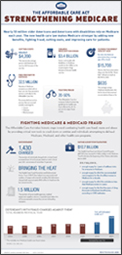Health Care and You
Until President Obama fought for and signed the Affordable Care Act, for decades, millions of Americans lacked the security of health care coverage they deserve. Because of the Affordable Care Act, millions of working and middle class families have the economic security of knowing that they won’t go broke if they get sick. Thanks to the ACA, millions of Americans who already had health insurance now have better coverage because women can no longer be charged higher premiums than men for the same plan, people with pre-existing conditions can no longer be denied coverage, and young adults won’t age off their parent’s policy when they turn age 19 or graduate from college.
SEE: Women and Families  Young Adults
Young Adults  Seniors
Seniors  Employers
Employers  Providers
Providers  Disabilities
Disabilities 
Women and Families
The health care law builds on what works in our health care system. And it fixes what’s broken by making improvements in several key areas. It protects you from the worst insurance company abuses. It makes health care more affordable. It gives you better access to care.

Ending Insurance Company Abuses: Thanks to the Affordable Care Act, insurers can no longer put a lifetime cap on how much care they will pay for if you get sick or cancel your coverage when you make a mistake on your paperwork. Health insurers are prohibited from charging you more because you are a woman.
More Affordable Care: Today, we have the 80/20 rule: insurance companies must spend at least 80 cents of your premium dollar on your health care or improvements to care. And insurance companies must publicly justify their actions if they want to raise premiums by 10 percent or more. And states have more power to block them.
Coverage for Young Adults: Under the Affordable Care Act, young adults under age 26 can stay on their parent’s health insurance plan until age 26. Due to this change and the law’s broader expansion of coverage, since 2010, 5.7 million young adults have gained coverage.
Coverage for Pre-Existing Conditions: Insurers can no longer deny coverage or charge more because of a pre-existing condition like asthma and diabetes.
Preventive Benefits: Most health plans must now cover preventive services ranging from cancer screenings to FDA-approved birth control to vaccinations for your child, without making you pay a copay or deductible.
Access to Affordable Insurance Women and families who may have been locked out or priced out of getting quality health insurance have access to affordable coverage. The Health Insurance Marketplace in every state offers a range of plans, and millions qualify for financial assistance. Learn more and sign up at HealthCare.gov.
Young Adults
The Affordable Care Act expands young adults’ affordable options for health insurance and gives hard-working families the security they need and important benefits. The law holds insurance companies accountable, gets rid of the worst insurance industry practices and puts patients first.

Coverage for Young Adults: Under the law, most young adults who can’t get coverage through their jobs can stay on their parents’ plans until age 26 — a change that has already allowed 5.7 million young adults to get health coverage and given their families peace of mind.
Get Preventive Services: You can get free preventive services that keep you healthy. If you are in a insurance plan, you can receive recommended preventive services, like flu shots, HIV and cancer screenings, contraceptive counseling and FDA-approved birth control, for free. Visit www.healthcare.gov/prevention for a full list of services and plan dates.
Coverage for Pre-existing Conditions: Insurers can no longer deny coverage or charge more because of a pre-existing condition like asthma and diabetes.
Access to Affordable Insurance: Young adults who may have been locked out or priced out of getting quality health insurance have access to affordable coverage. The Health Insurance Marketplace in every state offers a range of plans, and millions qualify for financial assistance. Learn more and sign up at HealthCare.gov.
Seniors
The health care law will help save money for seniors and ensure people with Medicare can see the doctor they know and trust.

The Affordable Care Act:
Strengthening Medicare
View the Infographic
Cheaper Prescription Drugs: If you’re in the donut hole, you will receive a 50 percent discount when buying brand-name prescription drugs covered by Medicare Part D. The discount is applied automatically when you fill your prescription—you don’t have to do anything to get it. These changes are already saving seniors billions of dollars. And by 2020, the donut hole will be closed.
End to Limits on Care: In the past, some people with cancer or other chronic illnesses ran out of insurance coverage because their health care expenses reached a dollar limit imposed by their insurance company. Under the health care law, insurers can no longer impose lifetime dollar limits on essential health benefits and annual limits are being phased out by 2014. More than 105 million Americans no longer have lifetime limits thanks to the law.
Free Preventive Services: Medicare now covers certain preventive services, like mammograms or colonoscopies for free. You also can get a free annual wellness visit.
Better Coordinated Care: Many doctors, hospitals, and other providers are taking advantage of options to help them work better as teams to provide you the highest quality care possible. They are working to get you the care you need at the time you need it.
Fighting Fraud: The Affordable Care Act builds on our efforts to combat fraud and abuse. These efforts are saving billions of dollars in money that was being stolen from people with Medicare. And thanks to these efforts and other reforms, the life of the Medicare Trust fund will be extended.
Protecting Medicare Benefits: Under the health reform law, your existing Medicare-covered benefits can’t be reduced or taken away. As always, you will be able to choose your own doctors.
Employers
The Affordable Care Act makes it easier for businesses to find better coverage options and builds on the employer-based insurance market already in place. It stops insurance companies from taking advantage of you, giving the consumer and business owner more control and making health care coverage more affordable.

Improving Affordability: Since the Affordable Care Act was enacted, health care prices have risen at the slowest rate in nearly 50 years. The average premium for employer-provided family health coverage went up only 3 percent in 2014, as measured by a leading survey of employer premiums. That's tied for the lowest rate increase on record since the survey began in 1999.
More Affordable Care: Today, we have the 80/20 rule: insurance companies must spend at least 80 cents of your premium dollar on your health care or improvements to care. And insurance companies must publicly justify their actions if they want to raise premiums by 10 percent or more for small businesses. And an increasing number of states have more power to block unreasonable premium increases from taking effect.
Common Sense Approach: The health care law makes improvements to the health insurance system we already have, and gives States significant flexibility to implement the law in the way that makes sense for their insurance markets. And, the law does not add a dime to the deficit. According to Congress’s official independent scorekeeper, the Congressional Budget Office, the law is completely paid for through a wide range of cost-saving reforms, from cracking down on health care fraud to helping hospitals and doctors spend their health dollars more wisely.
For Small Business Owners:
Small Business Tax Credit: Small businesses have historically paid 18 percent more for health coverage than larger employees. Today, a tax credit is available to businesses with 25 or fewer full-time-equivalent employees and average wages of $50,000 or less. To get more details and learn whether you might qualify, you should visit the IRS website.
Finding Insurance Options: The Health Insurance Marketplace makes buying health insurance easy. Small business owners in many states can offer their employees a range of plans from different insurers just like big employers do, while still receiving a single bill and writing a single check.
Health Care Providers
The health care law enacts comprehensive reforms that will hold health insurance companies accountable, protect you and your patients, and guarantee choice and control. It also reduces the burden of uncompensated care on physicians and hospitals by making access to care easier and more affordable than ever.

Ending Insurance Company Abuses: Insurers can no longer cancel coverage when a patient gets sick and set lifetime benefit limits that leave patients without coverage in times of catastrophic need. And if insurers don’t spend at least 80 percent of premium dollars on patient care and quality improvements, they’ll have to provide a rebate to consumers.
Expanding Access to Coverage: Patients who may have been locked out or priced out of getting quality health insurance have access to affordable coverage. The Health Insurance Marketplace in every state offers a range of plans, and millions qualify for financial assistance.
Cutting Red Tape: New rules save time and money for physicians and other health care providers by allowing you to spend more time in the exam room, and less on administration.
Opportunities and Incentives to Coordinate Care: The law created a new Innovation Center in the Centers for Medicare and Medicaid Services – specifically designed to identify and test new care and payment models to deliver greater value for our health system and then to rapidly spread what works. Thanks to input from hundreds of health care providers, we’ve developed a menu of initiatives that engage different types of providers and payers. Each initiative holds the promise of reducing health care costs, improving quality, and improving health care.
Strengthening the Workforce: The health care law also invests in training and placing thousands of new doctors and nurses, and it provides bonus payments to primary care doctors. The law is also creating and expanding health centers across the country. As a provider, this will help you see and spend more time with your patients.
People with Disabilities
If you’re living with a disability, private health insurance may be hard to come by. Even if you can afford to buy it, it probably doesn’t cover all of your needs. Worrying about where to get coverage and the cost of your care is the last thing you want to do. The Affordable Care Act is expanding your options for health insurance and making them more affordable.

Ending Insurance Company Abuses: Thanks to the Affordable Care Act, insurers can no longer put a lifetime cap on how much care they will pay for if you get sick, or cancel your coverage when you make a mistake on your paperwork.
Coverage for Pre-Existing Conditions: Insurers can no longer deny coverage or charge more because of a pre-existing condition like asthma and diabetes.
Access to Affordable Insurance: Americans who may have been locked out or priced out of getting quality health insurance have access to affordable coverage. The Health Insurance Marketplace in every state offers a range of plans, and millions qualify for financial assistance. Learn more and sign up at HealthCare.gov.
Long-Term and Community-Based Care Options: The law builds on successful models and provides incentives to States to expand efforts to offer people with disabilities more opportunities to receive the long term supports and services they require in their communities, through programs such as Money Follows the Person and Community First Choice Option.
